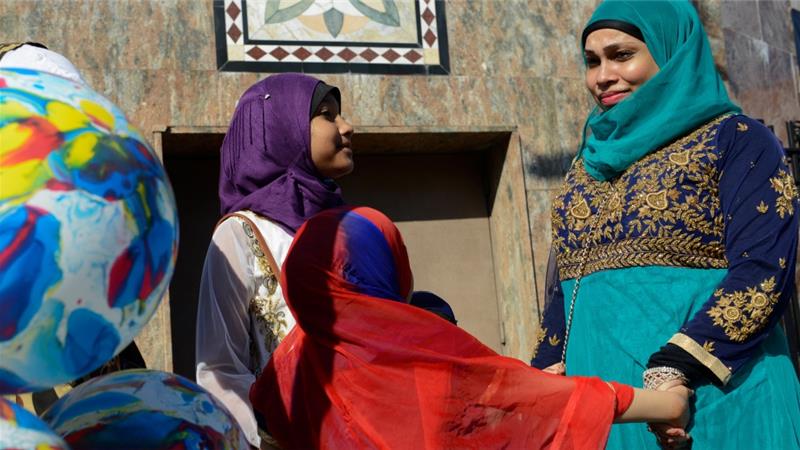
RNA - The day after the presidential election, my 14-year-old son left a message in the shower. With his little brother's foam alphabet letters, he spelled out, "Haters gonna hate us."
It was the "us" that transformed the popular catchphrase into something troubling. I knew that the rhetoric of this election cycle had affected my children, but here it was spelled out so clearly. My son felt the vitriol towards Muslims directed at him.
Over the course of the week, my daughter would ask if we were going to be banned from the country, pleading after my every reassurance, "But how do you know?" My five-year-old son asked if Trump would break our family. When I answered that as president, Trump would learn to be nice, he ran to share this news with his older siblings, his little feet light with relief.
I thought I faced discrimination when I was growing up as the daughter of Iraqi immigrants in a California seaside town. I still remember the first Gulf War and the novelty shops filled with distorted Arab faces on mugs and T-shirts, the camel jockey jokes, and the boy at the mall who told me to go back to Kuwait where I came from. Now I look back on the stereotypes and prejudice of the day, and it seems so innocent, so benign in comparison.
Nostalgia for antiquated ideas on immigration
When I was in the eighth grade, my teacher was an all-American, white male who played baseball and never failed to remind us that the United States was the greatest country in the world, the one place where anyone can become anything. "It doesn't matter where you came from," he'd say, "America is a melting pot."
Although the melting pot analogy is dated and contentious, as a first-generation American and the only Muslim in a Catholic grade school, it meant something to have the person of authority in my classroom repeat that I not only belonged in this country, but that my story was somehow an intrinsic part of our nation's identity. "We're all immigrants," he'd say and look over at me. "Everyone here came from somewhere and that's exactly what makes America special."
At the time, his words hardly impressed me. I didn't need my teacher to tell me what I lived every day. My family home was overcrowded with immigrating relatives who had waited close to 10 years for green cards to come to the US, and I knew the lived experience of immigration was far more complicated than this story of America's unbridled acceptance.
Melting pot or not, people were suspicious of my family's accents and our religion. My grandparents struggled to learn English and lived a life of relative isolation.
My classmates' curiosity, although mostly gentle and respectful, often made me feel like a foreign coin in their wallet, a token representation of all that was different. But I never doubted my right to be an American. Somewhere my teacher's message of equality had taken root within me.
I can't help but wonder if my children will grow up with a similar sense of security regarding their place in their country.
Last summer, our current president-elect claimed that Muslims don't assimilate. In response to Sean Hannity's question about how to vet the hearts of Muslims coming to the US, Donald Trump replied, "Assimilation has been very hard. It's almost, I won't say nonexistent, but it gets to be pretty close. And I'm talking about second and third generation - for some reason there's no real assimilation."
I never thought I'd long for the most simplistic and contested views of immigration. I want they myth of our soupy integrated society to be an option once again, a goal. I want recognition for all the painful and inadvertent ways my family and I surrendered our heritage to our English-loving tongues and our western educations.
I tell my son about the melting pot myth I grew up with and ask him if he feels the US can still call itself that. "Maybe for some people," he says, "but right now, it's like there's one ingredient that's giving everyone a rash and everybody just wants to pluck it out."
A grey zone
I'm glad my young son does not yet see the bitter irony of his statement. Terrorist activity caused America's allergy to Muslims, but it is exactly this physical rejection that terrorist groups have looked to exploit.
The Islamic State of Iraq and the Levant (ISIL) group has expressed its desire to eliminate the grey zone - the spaces inhabited by Muslims and non-Muslims alike, and our president-elect is fully cooperating with their vision by suggesting Muslims in the US are a fifth column.
This is the scenario I feared most after 9/11. My mind went straight to the hate. I saw it rippling through generations, the way it had with so many minority groups that had been forced to carry the blame for world events. Exactly a year after 9/11, my oldest son was born. It pained me to think he'd never know a time in this country when Muslims were not the enemy.
It is this generation of Muslim-Americans that weighs heavily on my mind. How will these smart, talented, vibrant young people maintain a sense of pride in their faith when their soon-to-be president rose to power on the promise of registering them in a database?
Political rhetoric matters. It filters down through our televisions, computers, and smartphones and straight into our bodies, shaping our self-concept and our attitudes towards others.
It is just as dangerous and lethal as any weapon in a government's arsenal. I hope, over the next four years, that Trump will choose his words more carefully.
847/940